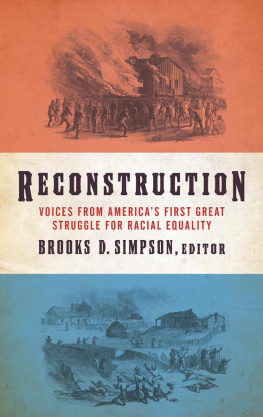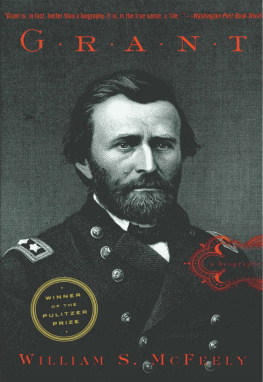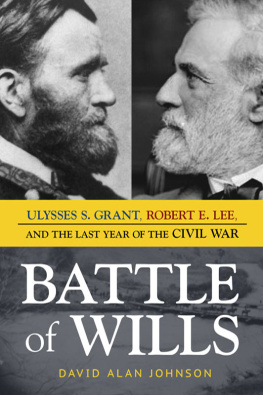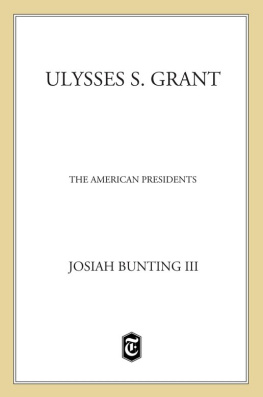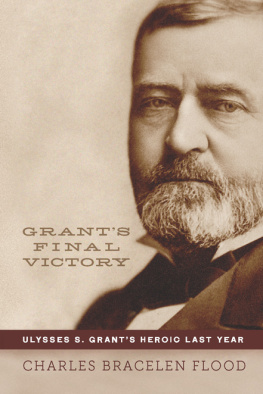1991 The University of North Carolina Press
All rights reserved
Library of Congress Cataloging-in-Publication
Data
Simpson, Brooks D.
Let us have peace : Ulysses S. Grant and the politics of war and reconstruction, 18611868 / Brooks D. Simpson.
p. cm.
Includes bibliographical references and index.
ISBN 0-8078-1966-2 (cloth: alk. paper)
ISBN 0-8078-4629-5 (pbk.: alk. paper)
1. Grant, Ulysses S. (Ulysses Simpson), 18221885. 2. United StatesPolitics and governmentCivil War, 18611865. 3. Reconstruction. 4. United StatesPolitics and government18651869. I. Title.
E672.S6 1991
973.7dc20 9150256
CIP
The paper in this book meets the guidelines for permanence and durability of the Committee on Production Guidelines for Book Longevity of the Council on Library Resources.
Manufactured in the United States of America
Parts of this book have appeared in somewhat different form and are reprinted here with permission of the publishers.
Butcher? Racist? An Examination of William S. McFeelys Grant: A Biography. Civil War History 33 (March 1987): 6383.
The Doom of Slavery: Ulysses S. Grant, War Aims, and Emancipation, 18611863. Civil War History 36 (March 1990): 3656.
Grants Tour of the South Revisited. Journal of Southern History 54 (August 1988): 42548.
01 00 99 98 97 5 4 3 2
ACKNOWLEDGMENTS
In the course of preparing this book, I have incurred debts personal and professional. E. Arthur Gilcreast of the Phillips Exeter Academy planted the seed for this endeavor when he challenged me to do some research on the Appomattox agreement. At the University of Virginia, Robert Brugger, Michael Holt, Robert Cross, and Charles McCurdy fostered my interest in Grant. Along the way, other historians have encouraged me, including La Wanda Cox, James Mohr, Roger Bridges, Albert Castel, Charles Wynes, Emory Thomas, and Bill McFeely, who had some helpful words of advice.
I would like to thank the staffs of the following institutions for assisting me in using their collections: the University of Virginias Alderman Library, the Illinois State Historical Society, the Newberry Library, Yale Universitys Sterling Library, Princeton Universitys Firestone Library, the Chicago Historical Society, and the Library of Congress. At the National Archives, Sara Dunlap Jackson was a source of encouragement, support, and information. The staffs of the State Historical Society of Wisconsin, Hoskins Library at the University of Tennessee, and the Sandor Teszler Library at Wofford College have provided warm havens for research.
At the University of Wisconsin-Madison, my fellow graduate students supported me in countless ways. Chris Berkeley, Nathan Peters, Kitty Kameon, Janice Steinschneider, Nancy Isenberg, Earl Mulderink, and Peter Knupfer always lent their ears and their hearts. Chris and Nathan deserve special praise for their sportsmanship, for the Bruins and Rangers never had a chance against Bryan Trottier and the four-time Stanley Cup champions, the New York Islanders. Thanks also go to Judy Cochran, who eased my way through the ordeal of dissertation completion, and to David Ecker, who put me up and put up with me during my first research trip to Washington. My three years at the Andrew Johnson Project at the University of Tennessee-Knoxville were memorable in many ways, but no more so than in the enduring friendships I formed with Pat Anthony, Marion Smith, Milton Klein, and John Muldowny. At Wofford College, Dan Maultsby was always supportive of my efforts, while Bill May offered not only his friendship and ever-ready ear but also a lay readers perspective. The staff of the Papers of Ulysses S. GrantJohn Y. Simon, David Wilson, and, during the years 198485, Wendy Hamandresponded to my queries, provided hospitality at Carbondale, and encouraged my work. At the University of North Carolina Press, Lewis Bateman took an early interest in this project; under extremely unusual circumstances Sandy Eisdorfer did an excellent job in turning a manuscript into a book; and Linda Picketts expert eye caught many an error, some of them twice.
I especially wish to thank Edith Grant Griffiths, the generals greatgranddaughter, for allowing me access to family papers not available for public use.
I have been blessed with some fine teachers at the University of Wisconsin-Madison. Stanley Kutler, in his own inimitable way, has provided me with opportunities to gain valuable professional exposure. Paul Boyer demonstrated anew his eclectic interests by serving on my dissertation committee, as did Leon Epstein. At the last moment, Edward Coffman generously agreed to survey the manuscript with his practiced eye. Allan Bogue, whether bemoaning the fate of the Cubs, speculating on the Islanders chances, or in just talking shop, opened up a world of warm collegiality I will always treasure. And Richard Sewell has been a model mentor. Others know of his skills at pruning prose and slaying excess verbiage; I will add that I enjoyed working with him as a teaching assistant and that I remain extremely grateful for his valued counsel and assistance in many areas.
Finally, there are those to whom I owe my most personal thanks. Misha has always been there, although she doesnt have the foggiest idea why. My sister Joy needled me incessantly, but she always made up for it in other ways, most notably by getting hockey tickets. My wife Jean has been a wonderful partner, giving time and energy that might have been devoted to her own scholarship. Finally, I want to thank my parents. I hope they can take satisfaction in whatever I achieve, because they have done all they could to make it possible.
April 9, 1990
Cold Spring Harbor, New York
INTRODUCTION
Most Americans know two Ulysses S. Grants. Celebrated as one of the Republics greatest generals, he is denigrated as one of its worst presidents, an image summed up in Henry Adamss terse statement, A great soldier might be a baby politician.
This dichotomy of good general/bad politician, with Appomattox as the dividing line, prevails in the literature about Grant. Of course, some have dissented. Catton, McFeely, and T. Harry Williams suggested that Grant demonstrated political shrewdness as a general in handling superiors and subordinates, an argument summed up in Williamss statement that Grant appreciated the vital relationship in a democracy between war and politics. More recently, several historiansnotably
This study questions such distinctions in Grants military career. It offers a new understanding of Grants actions between 1861 and 1868 by delineating the interrelationship of warmaking and peacemaking during that period. Essential to this argument is the understanding that the American Civil War was first and foremost a civil war, and that the Norths chief aim was to preserve the Union by subduing a Southern rebellion. Conquering the Confederacy was but one step of the Union effort; reintegrating the defeated South into the reunited states was of equal importance. Reconstruction began at Fort Sumter; Appomattox, although an essential step, left much unsettled. The struggle for reunion spanned both war and peace. Moreover, it soon became apparent that military victory was impossible without the eradication of slavery, an issue that complicated and transformed the process of reconciliation. To strike at the peculiar institution would not only spark a social revolution of untold dimensions but would also embitter already disgruntled white Southerners. After emancipation, protecting blacks from violence, intimidation, and discrimination worked at cross-purposes with attempts to renew white loyalty. To engage simultaneously in revolution and restoration proved a difficult task. In facing these problems in war and peace, Ulysses S. Grant was both warrior and statesman from 1861 to 1868. To him, the Civil War and Reconstruction were part of the same long struggle to preserve the Union, destroy slavery, and establish a durable peace to secure what Grants contemporaries called the fruits of victory.


